
Gregory James LeMond is an American former road racing cyclist. LeMond won the Tour de France three times and the Road Race World Championship twice, becoming the only American male to win the former.
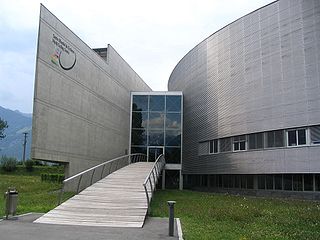
The International Cycling Union is the world governing body for sports cycling and oversees international competitive cycling events. The UCI is based in Aigle, Switzerland.

Philip Alexander Liggett is an English commentator and journalist who covers professional cycling.

Sport is an important part of Australia that dates back to the early colonial period. Australian rules football, rugby league, rugby union, association football, cricket and tennis are among the earliest organised sports in Australia. Sport has shaped the Australian national identity through events such as the Melbourne Cup and the America's Cup. Australia also holds the record for the largest attendance at a rugby union match; almost 110,000 spectators watched the Wallabies play the All Blacks in 2000.
Paul Kimmage is an Irish sports journalist and former amateur and professional road bicycle racer, who was road race champion of Ireland in 1981, and competed in the 1984 Olympic Games. He wrote for The Sunday Times newspaper and others, and published a number of books.
David Joseph Walsh is an Irish sports journalist and chief sports writer for the British newspaper The Sunday Times. He is a four-time Irish Sportswriter of the Year and a three-time UK Sportswriter of the Year. Walsh was the key journalist in uncovering the doping program by Lance Armstrong and the US Postal Service Cycling Team, leading to a lifetime ban from cycling for Armstrong and being stripped of his seven Tour titles.
This timeline of the 2000s in sports is a chronological list of sporting events between 2000 and 2009.
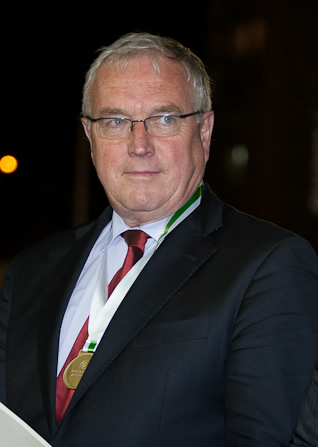
Patrick "Pat" McQuaid is an Irish former road racing cyclist who served as the president of the Union Cycliste Internationale from 2005 to 2013.

LeMond Racing Cycles is a bicycle company founded by Greg LeMond, the only American winner of the Tour de France.
Hein Verbruggen was a Dutch sports administrator who was president of the Union Cycliste Internationale (UCI) from 1991 till 2005 and president of SportAccord from 2004 to 2013. He was an honorary member of the International Olympic Committee (IOC) since 2008. Previously, he was a member of the IOC and Chairman of the Coordination Commission for the Games of the XXIX Olympiad in Beijing in 2008. He is highly suspected to have protected Lance Armstrong.

Edward Borysewicz, sometimes known as "Eddie B", was a cycling coach who brought the United States to world prominence, even though at first he barely spoke English. The US team, under his direction, won nine medals at the Olympic Games in Los Angeles in 1984. It was the first time Americans had won medals since 1912. Audrey McElmury won the World Road Cycling Championships in 1969, followed by Beth Heiden, in 1980.

The Floyd Landis doping case was a doping scandal that featured Floyd Landis, the initial winner of the 2006 Tour de France. After a meltdown in Stage 16, where he had lost ten minutes, Landis came back in Stage 17, riding solo and passing his whole team. However, a urine sample taken from Landis immediately after his Stage 17 win twice tested positive for banned synthetic testosterone as well as a ratio of testosterone to epitestosterone nearly three times the limit allowed by World Anti-Doping Agency rules. The International Cycling Union stripped him of his 2006 Tour title. Second place finisher Óscar Pereiro was officially declared the winner. The only previous Tour de France winner to be disqualified at the time was the 1904 Tour's winner, Maurice Garin; however, in the following years Alberto Contador and Lance Armstrong would have tour wins revoked.

Lance Edward Armstrong is an American former professional road racing cyclist. He achieved international fame for winning the Tour de France a record seven consecutive times from 1999 to 2005, but was stripped of his titles after an investigation into doping allegations, called the Lance Armstrong doping case, found that Armstrong used performance-enhancing drugs over his career. As a result, Armstrong is currently banned for life from all sanctioned bicycling events.

Association football is the most popular sport in almost all African countries, and in 2010 South Africa became the first African nation to host the FIFA World Cup.
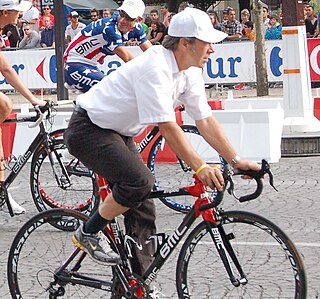
Jim Ochowicz is a former Olympic bicyclist and manager of UCI WorldTeam CCC Pro Team. He served as president of the USA Cycling Board of Directors from 2002 to 2006.
Skins, stylized SKINS, is an Australian manufacturing company founded in 1996 that designs and produces compression garment for athletes and sports enthusiasts. After filing for bankruptcy in 2019, the company was acquired by Hong Kong–based holding Symphony, which owns rights over the "Skins" brand.
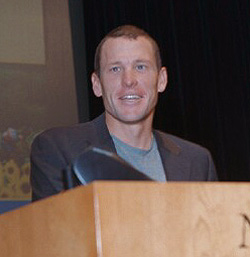
For much of the second phase of his career, American cyclist Lance Armstrong faced constant allegations of doping, including doping at the Tour de France and in the Lance Armstrong doping case. Armstrong vehemently denied allegations of using performance enhancing drugs for 13 years, until a confession during a broadcast interview with Oprah Winfrey in January 2013, when he finally admitted to all his cheating in sports, stating, "I view this situation as one big lie that I repeated a lot of times".
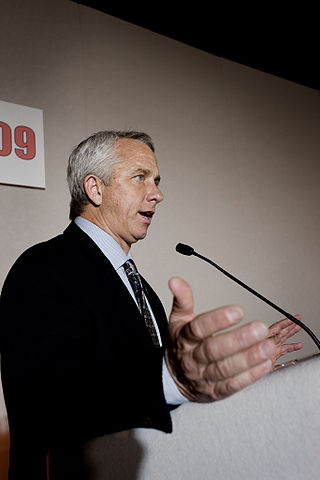
Greg LeMond competed at a time when performance enhancing drugs were just beginning to impact his sport. Rumors of improprieties existed, including USA Cycling's blood doping at the 1984 LA Olympics and Francesco Moser's same measures prior to his 1984 assault on the hour record, but legalities were not sharply demarcated and the practice was not spoken of in the open. Considered one of the most talented cyclists of his generation, from his earliest days of professional cycling LeMond was strongly against taking performance enhancing drugs, largely on the basis of the health risks such practices posed. His career lacks the suspicious results that have tarnished his successors. His willingness to speak out against doping and those prominent individuals involved inadvertently linked him with the sport’s doping scandal controversies. In his opposition to fraud, corruption and what he saw as complicity on the part of cycling officials, LeMond became a lightning rod with the sports most prominent personalities.

United States Anti-Doping Agency v. Lance Armstrong, the Lance Armstrong doping case, was a major doping investigation that led to retired American road racing cyclist Lance Armstrong being stripped of his seven consecutive Tour de France titles, along with one Olympic medal, and his eventual admission to using performance-enhancing drugs. The United States Anti-Doping Agency (USADA) portrayed Armstrong as the ringleader of what it called "the most sophisticated, professionalized and successful doping program that sport has ever seen."
Australia has been at the forefront in the fight against doping in sport. It was one of the first countries to establish a sports anti-doping agency and is a member of World Anti-Doping Agency (WADA). Australia abides by World Anti-Doping Code. In 2010, Australian John Fahey was re-elected as President of WADA for a second and final three-year term which finished at the end of 2013. Australia like other major countries has been embroiled in major doping in sport controversies and issues.














